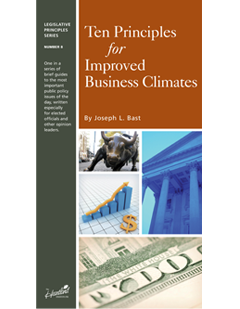The “business climate” of a nation, state, or city refers to the combined effect on businesses of public policies, natural endowments, and other assets that affect business start-ups and profitability. A good business climate encourages existing businesses to grow, people to start new businesses, and national and international businesses to invest in an area. A poor business climate does the opposite.
Maintaining a good business climate has never been more important. Thanks to the Internet, the collapse of communism around the world, and advances in shipping and logistics, capital and labor are much more mobile than in the past. Businesses must bid for customers and workers not only from local competitors but from businesses in other communities, in other states, and even in other countries. Small changes in taxes, regulations, and other cost-drivers can lead to businesses losing customers and possibly failing or relocating.
There is no single list of factors or recipe for a good business climate. At least four business magazines – Forbes, Site Selection, CEO Magazine, and Directorship Magazine – regularly rank the states using a mix of publicly available data and the judgement of their reporters. Forbes, for example, describes its methodology as follows:
First, we look at projections of job, income and gross state product growth. We also examine venture capital money going into an area as well as new businesses that have cropped up in the past three years. Another addition is the role that government plays on the business climate in terms of environmental and labor laws, as well as taxes and incentives. These factors play out on the state level instead of on the local level. Overall, we examine 32 criteria to assemble the list (Badenhausen 2007).
Forbes bundles those 32 criteria into six categories: business costs, labor, regulatory environment, economic climate, growth prospects, and quality of life.
Independent think tanks also produce business climate rankings that have the virtue of being more objective and data-driven, although no two indices present the same combination of factors or sources of data or give each variable the same weight. They include the American Legislative Exchange Council (ALEC), Beacon Hill Institute, Cato Institute, Council on State Taxation (COST), Heritage Foundation, Small Business & Entrepreneurship Council (SBEC), and Tax Foundation. The latest rankings are available on the Web sites of these organizations.
These examples of business climate indices suggest some agreement on the factors most likely to affect a state or nation’s competitiveness. The ten principles of a good business climate that follow draw from these and other sources.

